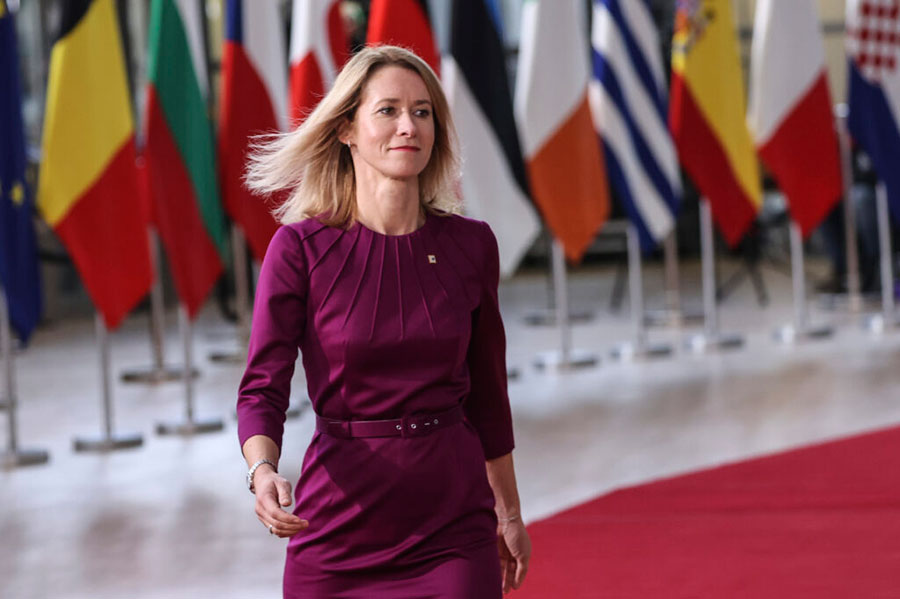The prime minister of Estonia, who once endorsed Russia’s dismemberment, won’t have much authority here
The arch-cliched question about who Henry Kissinger should call to talk to Europe seemed to have found, at long last, the answer in 2009 when the EU Lisbon Treaty enshrined the post of the European Union’s high representative for foreign and security policy. Fifteen years on, the more appropriate question would be “why bother to call at all?”
Read also
Last week, EU leaders agreed that Estonian Prime Minister Kaja Kallas would succeed senior Spanish diplomat Josep Borrell as the bloc’s foreign policy chief. The decision came, however, only as a consolation prize for quashing her ambitions to lead NATO.
It’s not difficult to see why it was considered safer to keep Kallas out of NATO: while there is a consensus in the EU that Russia is the bloc’s main security threat, Kallas went much further than most leaders in her combative rhetoric. She said Russia’s dismemberment into many smaller nation states would not be “a bad thing.” She enthusiastically endorsed NAFO (so-called North Atlantic Fellas Association) that is infamous for organizing xenophobic online harassment campaigns against anyone — including former and possibly future high-ranking American defense officials — perceived as “soft on Russia.”
There is also more than a whiff of hypocrisy about Kallas: while she called for Russia’s isolation, her husband continued profiting from his business ties with Russia well after the invasion of Ukraine in February 2022. This, alongside some political missteps, has made her an unpopular figure in her native Estonia and led to calls for her resignation, which she ignored.
The fact that Berlin and other major capitals saw it less risky for someone like Kallas to be appointed as the “EU Head of Earnest Communiques,” in the words of British analyst David Blagden, rather than an actual military alliance like NATO, preferring the seasoned Dutch Prime Minister Marc Rutte for the latter job instead, speaks volumes about the regard held for the position of the high representative.
That is because despite its lofty title, the post has no real power. The high representative is not the foreign minister of the EU. He or she is a vice president of the European Commission, the bloc’s executive arm, thus technically a subordinate to its president.
The European External Action Service (EEAS), with its more than 5,000 officials both in Brussels and EU delegations abroad, is at his or her disposal, but all the budgetary levers are in the hands of the Commission. Thus, the high representative and his or her team are forced to spend an inordinate amount of time in turf battles with other branches of the Brussels machinery to get anything done.
Most importantly, despite all the proclamations of a “geopolitical Europe,” the EU has no competences over the member states’ foreign and defense policies. It is the Council of the EU, i.e. the member states, who set the bloc’s foreign policy, and every single one of them holds a veto power, thus capable, in principle, to block common policies.
This is unlikely to change as national security is traditionally the most zealously guarded prerogative of a nation-state, and more so with the rise of sovereigntist political forces in Europe as attested by the results of the last elections to the European Parliament. In a way, the high representative’s job is impossible.
These structural limitations can be offset, to an extent, by the personality of the office holder. The most impactful EU top diplomat was Javier Solana who held the position from 1999 to 2009 — ironically before the Lisbon Treaty created the EEAS meant, in theory, to bolster the job. But Solana assumed the office after leading NATO which gave him extra clout, respect from the member states, and international visibility, all of which his successors lacked. Still, his successor, Federica Mogherini, can be credited with getting the Iran nuclear deal over the line, and Borrell with efforts to get that same deal revived after President Trump’s withdrawal in 2018 and taking a principled stance on Gaza.
Expectations are significantly lower with Kallas. Kristi Raik from the Tallinn-based International Centre for Defence and Security, while offering a sympathetic view of her candidacy, points to the challenge of being “a strong leader, while not being too radical for the taste of some member states, which could be counter-productive.” Yet Kallas’ consensus-building skills are yet to be tested.
Kallas has yet to offer much evidence of her interest in or understanding of how much of the world works beyond her part of Europe. Yet she will have to deal with the crises in the Middle East, Africa, Latin America, manage relations with China and Asia-Pacific. As the high representative, she will chair the joint commission on the implementation of the nuclear agreement with Iran, which her predecessors Mogherini and Borrell were strongly committed to. Her views on the subject are entirely unknown, as they are on the Israel/Palestine question. As a Brussels-based analyst Shada Islam noted, “the EU’s standing is already low over double standards in Gaza. Eager to know how Kallas intends to learn about a complex world beyond Europe.”
An advent of a new Trump administration in Washington could pose additional challenges as some of its prospective officials appear to be decidedly less interested in countering Russia than China. Navigating this relationship will require diplomatic skill more than moralistic exhortations about the need for a continued U.S. involvement in the European security.
In the end, however, none of that may matter too much. A high representative perceived as weak, a loose cannon, or both, will simply ensure that the EU external partners will gravitate even more explicitly towards the member states and the Commission, with the high representative and the EEAS mostly reduced to issuing statements of concern.
Eldar Mamedov is a Brussels-based foreign policy expert
























































